“Together we’re advancing initiatives focused on creating safer, more efficient travel options for all modes of transportation, from vehicles to bicycles to pedestrians,” Dave Ambuehl, the chief deputy district director of Caltrans, said in a news release.
https://www.sfgate.com/travel/article/new-intersection-project-first-kind-bay-area-19901199.php
I support a car ban, but these are actually very well designed.
As mentioned in the video, these are pretty hostile to pedestrians. Without knowing too much about the subject, I wouldn’t be surprised if roundabouts beat them handily - why else would countries with better road safety opt for roundabouts over diverging diamonds?
Theyre extremely car-centric, space-inefficient, wildly expensive, and don’t do anything to solve traffic.
None of which are problems they’re actually trying to tackle.
They improve traffic a bit (not solve), and are substantially safer. They’re only meant to do those 2 things, and they’re good at it. Nobody thinks a single intersection idea will fix transportation as we know it.Together we’re advancing initiatives focused on creating safer, more efficient travel options for all modes of transportation, from vehicles to bicycles to pedestrians
They spent $25M not making travel safer for bicycles and pedestrians, and explicitly making travel less efficient by inducing car demand. $25M could buy Caltrans an entire set of one of their new Stadler kiss trains, to go from 24 trains sets to 25.
edit: Actually this intersection is more dangerous than the existing intersection. It doubles the amount of pedestrian signals that pedestrians have to cross, and eliminates the sidewalk on the east side. Plus, they’re cutting down like 8 trees and not replacing them. This is urban decay.
That quote isn’t referring solely to this specific intersection design.
But yes it’s also safer for bicycles and pedestrians. Just not as safe as not using cars.And spending $25 million on a 25th train instead, wouldn’t make this interchange 60% safer. Or even 5% safer.
Again. It’s better. Nobody claims it’s perfect.
It’s worse than the existing interchange. This is a one-more-lane project that makes the neighborhood worse for bicylists and pedestrians.
The project will implement a Diverging Diamond Interchange design that will significantly improve traffic flow and safety, while reducing congestion and greenhouse gas emissions. At the end of the project, it will be both safer and easier for motorists, pedestrians, and cyclists to access and navigate.
This project will relieve congestion and improve traffic flow on local streets, improve the existing interchange and intersection operations, improve the safety of local streets, and increase capacity of the local roadway network to support future growth. See the Updates tab for related Project Documents.
https://sta.ca.gov/project/redwood-parkway-fairgrounds-dr-improvement-project/
Are you using marketing statements as evidence of… Anything?
That’s almost never a good idea.
I explicitly said I’m anti-car (read: I’m aware they’re car-centric). The rest of this is either outright false, or isn’t solved more effectively by any car-centric alternative.
Diverging diamonds are among the best interchanges in existence. That doesn’t mean they’re great, but they solve far more problems than they introduce.
Please direct your weapons where they actually matter–asphalt itself.
It just seems strange to portray highway interchanges in a positive light. Like, they might be the safest interchange for stroads intersecting an interstate, but that’s kinda like putting a $25M bandaid on a bullet wound.
I want you–a random individual–to go on stage, and tell the country that just elected Donald Trump to make cities walkable.
Have a ball.
DDIs are the best we have right now. At the very least, the conservative nutjobs in my city don’t detest them to hell… much. They can be scaled down, and single lane versions would be perfectly acceptable in a walkable city.
Transportation planning is a local issue, not a national issue. Obviously national funding plays a role, but you don’t need national funding for sidewalks and bike infrastructure. Vallejo’s local and state government representatives are all Democrats.
they solve far more problems than they introduce.
It is worse for pedestrians, who now have twice as many traffic signals to wait for. It is worse for cyclists, with “gauntlet” bike lanes running between through- and right-turning lane. It is only better for cars…so hardly the “best” interchange in existence.
I’m analysing my local interchanges, and the DDI still appears the safest large intersection in my entire city for pedestrians and cyclers. Add barriers that stupid Americans seem all too eager to detest, and you’ve still got something far safer than anything else available. Make the interchange single-lane at that, and it integrates nicely with a hypothetical walkable city.
I just don’t see how it’s more dangerous than standard intersections for others. Bicycles still ride the same path that the cars do, and pedestrians needn’t worry about right turns on red.
This is a trivial matter compared to the entire rest of the city.
Highway interchanges aren’t good places for pedestrians or cyclists at the best of times. Just take a look at the current intersection.
I have no clue how you are getting down voted in a fuckcars community for pointing out this infrastructure is still car centric and does nothing to solve traffic, only induce demand.
If this area was designed for people only it would not look like this.
This is still city planners creating a dangerous strode and intersecting it with a interstate highway and calling it good enough.
These are legitimately some of the only interchange designs which integrate nicely with pedestrian paths and bike lanes.
I’m not sure if there’s any safe way to have level crossings for bicycles and pedestrians across highway ramps. The safe ones are almost always underpasses or overpasses. There’s a bicycle path in Stockholm at the end of a highway ramp as it merges onto a 50 km/h road, and I’m terrified to use it.

North American has this concept in roadway design where traffic engineers feel the need to make every roadway large. Think of interstate interchanges.
There is also this need to try and design roadways as both roads and streets, while maintaining the flow of high speed traffic at the same. This leaves us with neither good roads or enjoyable streets.
Roads get you from point A to point B without regard for what’s in between or along the route. They are meant to move large amounts of traffic with minimal to no lights/stops/driveways.
Streets on the other hand are “destinations” and are meant for the people that live along them. Streets are traffic calmed, streets give the right of way to pedestrians. Streets have driveways, and multiple interaction zones between people on foot, on bikes, and on cars.
A street cannot act as a road nor can a road act as a street.
This image trys to turn the underpass into a street (which it can be), but it’s main function is still designed as a high-speed roadway. So this leaves us with a combination of the two (a strode) which neight is a good road or a enjoyable street for the local community.
Some examples of simplified highway off ramps that connect directly into traffic calmed streets.
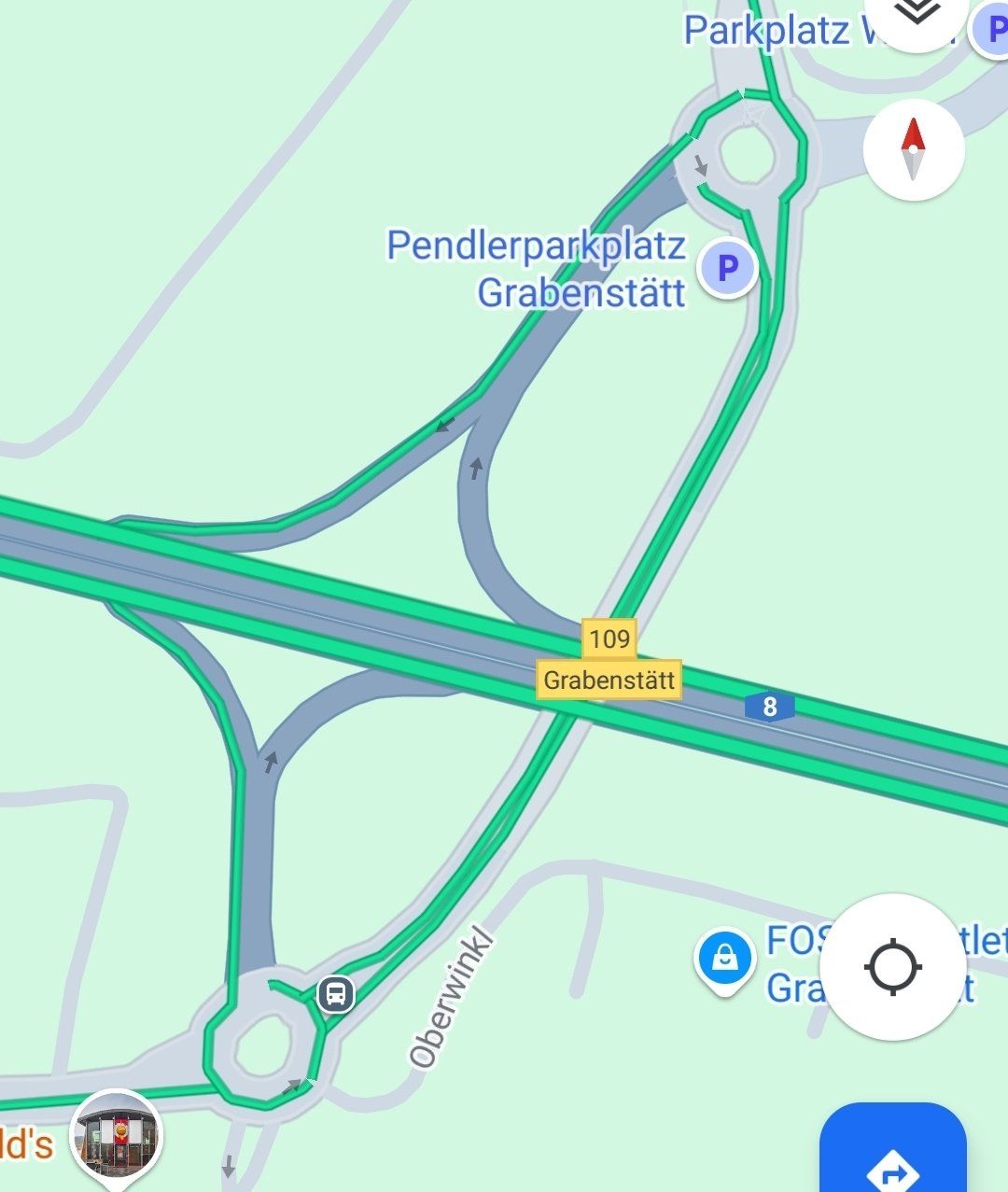
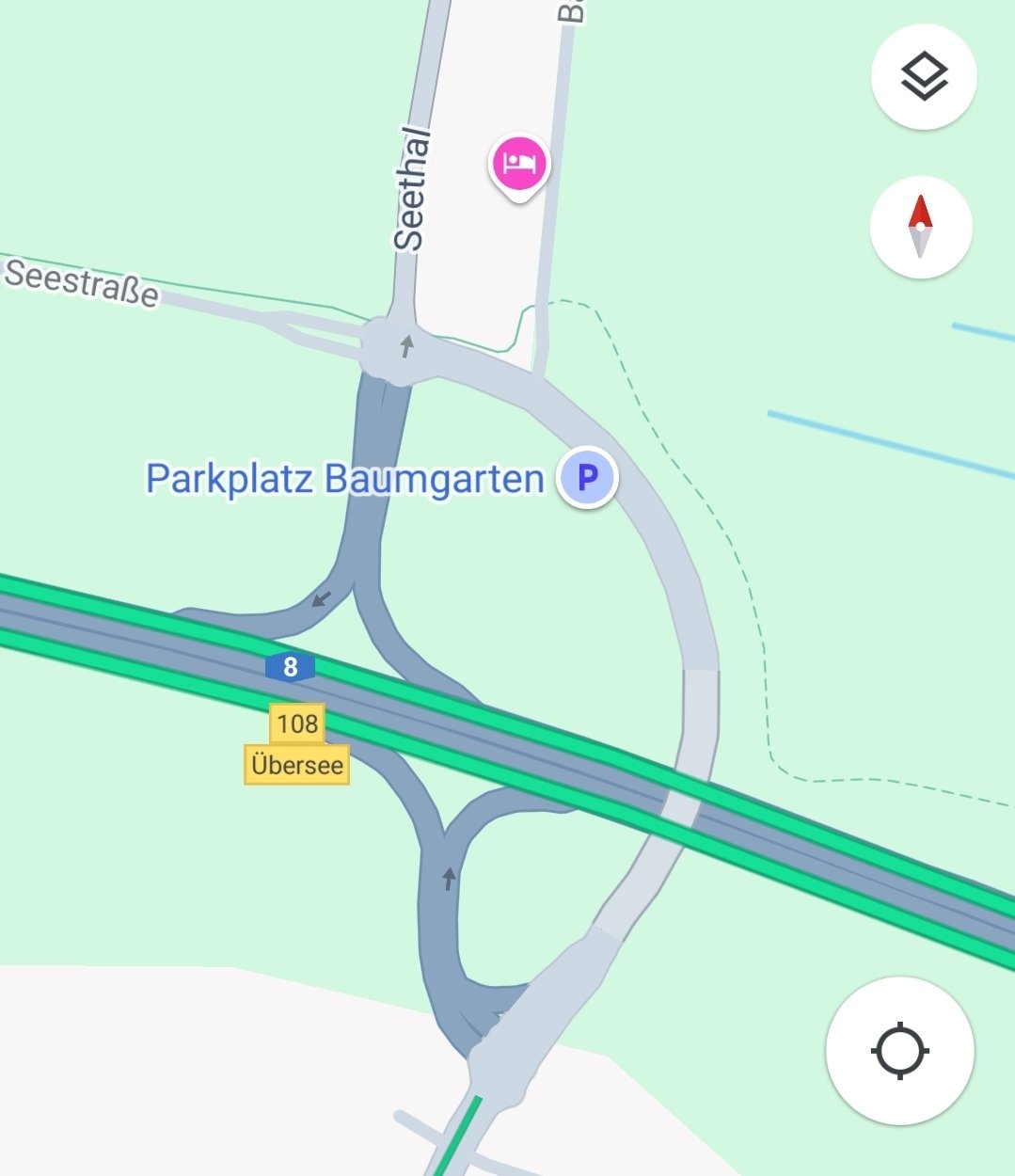
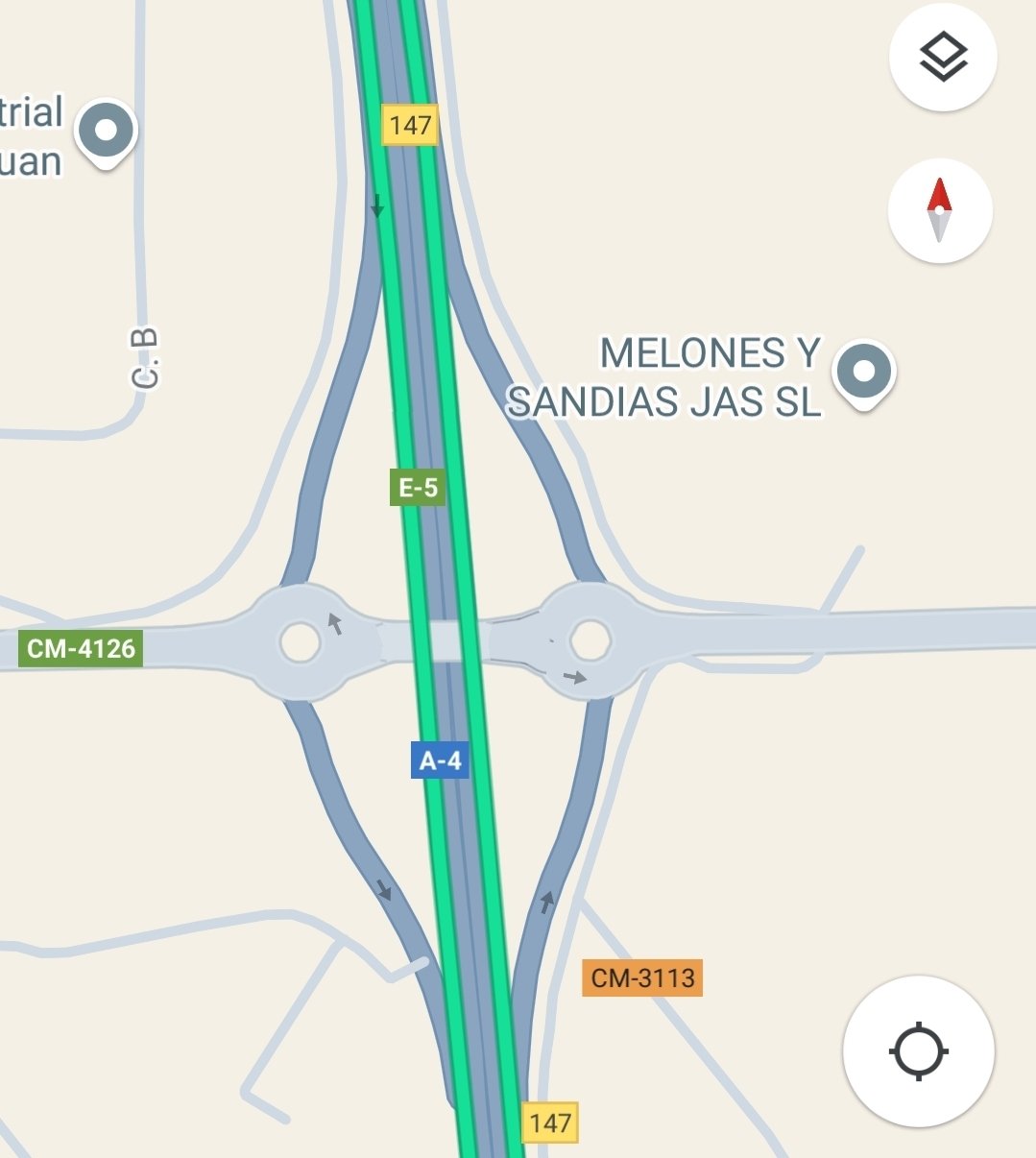
City planing also plays a role here, and its usually has to do how our we build city centres right next to highway off ramps. This leaves no room for proper roadway design where you “stepdown” your roadway classification.
Good planing would have a interstate (130-100kph) connect to a highway (100-80kph), which then empties into a high-speed road (80-60kph), which steps down to a road 50-40kph, and then transitions into a street (30-10kph).
Instead we have interstate highways empty right into a city street.
I always wondered if instead of a two lane road every block you could have a city where it’s a four lane road every two blocks, with a single lane pedestrian/bicycle street alternating every other block there isn’t a road.
I’m not saying it’s good (those bike lanes look horrible), but they put in a diamond interchange in my city and it’s ironically the best car infrastructure we have.
To be fair this looks slightly worse than ours, ours has more separation for pedestrians, but I feel much less stressed out that I only have to look one way when crossing, and no cars should be able to go when I am.
They still do. they’ll run a green arrow light, probably because they’re used to “right turn on red”. I have been tapped by a car I was playing chicken with at that light.
But other than the presence of morons, I’d pick the FREEWAY INTERCHANGE over a normal city light any day. That’s crazy to say but it just goes to show how even slightly better designed infrastructure makes a difference.
Those bicycle lanes are ass though.
Fuck cars
But if there are cars, you want these
Yeah diamond interchanges kick ass. They made me nervous the first time I used one, since it was the kind where you end up driving on the opposite side of the road. But just follow signs and you’ll get where you need to go and there’s almost no risk compared to the garbage interchanges you usually see around interstates.
I wouldnt bike on that painted bike lane across a right turn slip lane designed to make cars slow down as little as possible coming off the freeway
There should be a protected bike lane in the median with a dedicated signal where the diamonds cross
Painted bike lanes are just Dodge Ram kill zones.
Those aren’t bike lanes. They are merging guides for the cars. So yeah it’s still lacking but better than a cloverleaf.
Edit: sorry, there are bike lanes. I hadn’t noticed that there were two colors on my mobile
Since there are traffic lights, I personally would no be worried about taking my bike through
This is a meat grinder for cyclists.
Those aren’t bicycle lanes, they’re clear zones to protect drivers so they won’t hit a tree or a pole and ding their $100k truck.
All that could happen is that they kill a bicyclist and drag them for a few hundred feet, but that washes off.
If the truck on the bottom right made a right turn instead of going straight, it would cross a cycle lane.
But that right turn would mean driving in the wrong direction. See the arrows? Diverging diamond intersections Force traffic to drive on the left side of the road instead of the right.
I think he means take a right onto the freeway on-ramp, just before the diverging part.
OH! I see, now. The one I usually ride on has separated/raised bike paths in those areas which shortens the distance you have to cross
Yeah wouldn’t it make more sense to have the bike paths go on the outside of the diamond?
Why tho? Every possible collision point is regulated by traffic lights
Not this one:
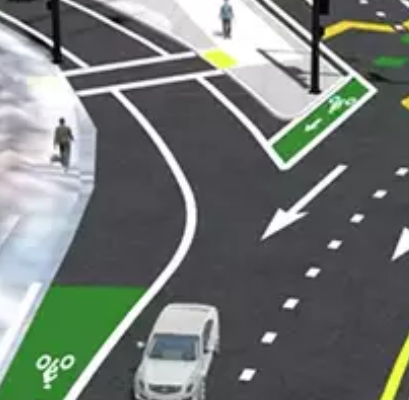
Edit: who the heck wants to walk on the shoulder of a gigantic road like that too… wtf
That right turn lane has a light on it. It’s next to the ped crossing.
Ah so it does.
It is. There are traffic lights in front of the crossing for pedestrians and the bicycle lane is parallel to the car lane and logically both of the can only have a green light if the cars from the left have a red light and also the pedestrian have a green light for crossing.
No, there are 2 spots where cars turning right cross a cycle lane going straight, without a traffic light.
One of them is on the lakes coming from the left, the other on the lanes in the background coming towards the viewer.Theres a rule that no one follows on the roads, when turning right (or left for that matter) you come to a complete stop and then proceed. This applies even if there is no stop sign or the light is solid green.
The only exception to this is if your signal light shows a green arrow pointing right, or left.
The location in the image pointed out above tells motorists they can proceeded at full speed, run over the pedestrian at the crossing, run over the cyclists (that has the right of way), and drive head first into traffic in a effort to murge as quickly as possible.
There should (at the minimum) be painted yeild the right of way marking on the road. Both before the pedestrians crossing at the off ramp and right before the bike lane crossing, which should be painted continuously.
Kind of like this.
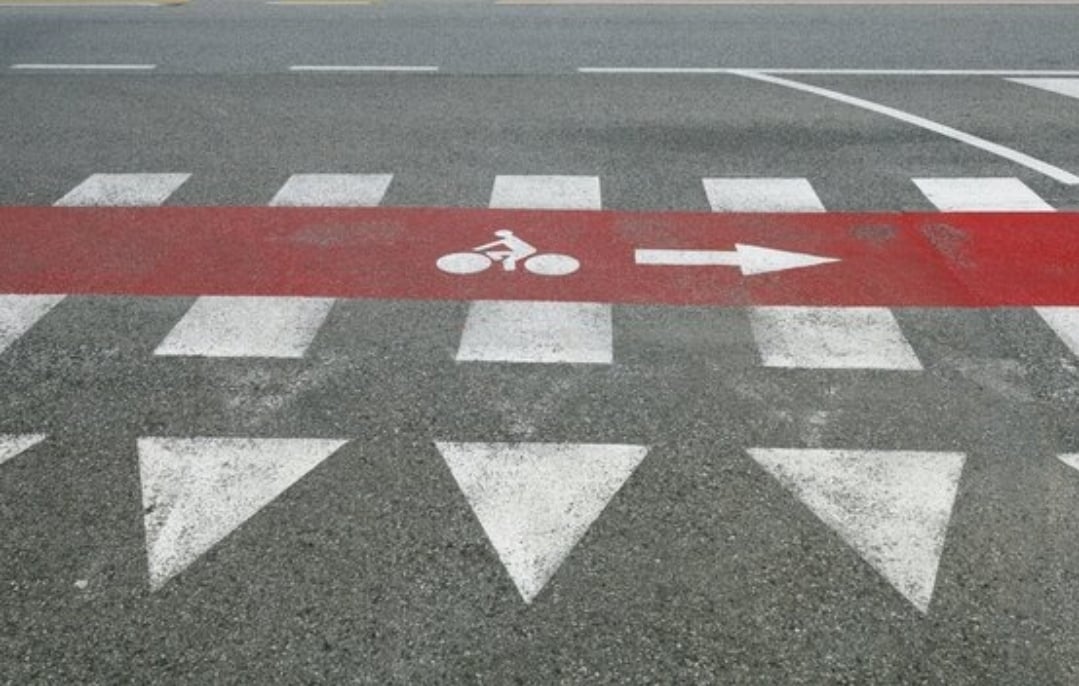
Though paint is no substitute for proper roadway design.
Theres a rule that no one follows on the roads, when turning right (or left for that matter) you come to a complete stop and then proceed. This applies even if there is no stop sign or the light is solid green.
Can you cite this law? I’ve never heard of this. You have to yield to pedestrians, but coming to a complete stop for a right on green seems excessive. I’ve not once seen this, nor heard this is how it’s supposed to work. Right on red, sure. Same with left on green, why would you come to a complete stop and potentially get rear-ended?
Found this article which says it’s not true in Canada:
Its been many years since my driving school courses and being taught by the instructors in car, but seem you may be correct in the laws ambiguous wording on this after I did some reading myself.
Personally the instructors and the driving test individuals that I talked with (years ago) all stated that its prudent to treat intersection as if there were always the possibility of a pedestrians, cyclists, or other car being there. This meant that you would always slow down, stop, and yeild the right of way.
Reading this handbook in my local area, diagram 2-20 states this.
“At any intersection where you want to turn left or right, you must yield the right-of-way. If you are turning left, you must wait for approaching traffic to pass or turn and for pedestrians in or approaching your path to cross. If you are turning right, you must wait for pedestrians to cross if they are in or approaching your path (Diagram 2-20). You should also check your blind spot for cyclists approaching from behind, particularly in a bike lane to your right, on a sidewalk or a trail.”
I admits it does not say stop explicitly. Though my driving style after all these years is to always treat intersection (especially those with sidewalks and bikelanes along them) with extra care and always slow down, stop, and prepare to yeild the right of way to more vulnerable road users.
https://www.ontario.ca/document/official-mto-drivers-handbook/driving-through-intersections
This is actually one of the most efficient compact interchange designs though. It integrates way more elegantly with accessory roads without creating huge dead zones.
Barriers where?
There is possibility that some biker will select wrong way.
I see ambiguous markings right before bridge.Criss cross crash! What about a big ass 200stories tall ramp with an elevator and a loop to loop at the bottom?
…but why
deleted by creator
We have a couple of those in Minneapolis.
Jesus Christ that’s a fucking recipe for collisions.
There are traffic lights nearly everywhere, so: no
I think you aren’t particularly familiar with how drivers treat traffic lights on multi-land thoroughfares.
And that intersection is setting up collisions to primarily be head on.
That’s just your status quo bias.
This video explains how it’s remarkably better.I live in an area with a diverving diamond. I’ve never heard of any collision there. That’s unlike our local mall entrance shitshow, which has a major accident every other day.
Then it’s still not a design problem, but a problem that traffic rules are not enforced.





